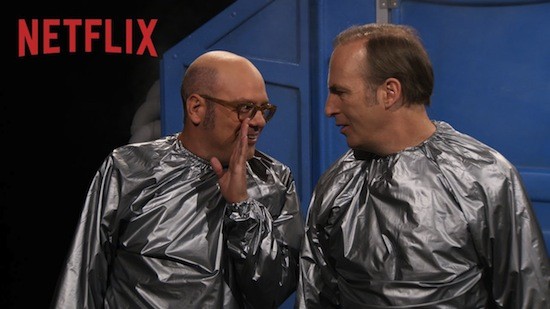Lesson number five in Yale history professor Timothy Snyder’s On Tyranny: Twenty Lessons From the Twentieth Century is “Remember Professional Ethics.” Snyder writes, “When political leaders set a negative example, professional commitment to just practice becomes more important.”
Few people have ever accused Hollywood of having “professional ethics.” Long gone are the days when Dalton Trumbo would write a patriotic paean like Thirty Seconds Over Tokyo and then get hauled in front of the House Un-American Activities Committee for his troubles, or where John Sturges could condemn Japanese internment with Bad Day at Black Rock, or where Dustin Hoffman and Robert Redford could star in All the President’s Men and make it one of the biggest movies of the year. Nope, these days it’s all $100 million toy commercials and fascist dreck like 13 Hours: The Secret Soldiers of Benghazi. Do successful filmmakers have a duty to the Republic? Don’t make Michael Bay laugh into his Porsche collection.
This is why, even if The Post wasn’t a rip roaring great movie, it would still be a remarkable presence in the theaters of 2018. At age 71, with an estimated net worth of $3 billion, Steven Spielberg didn’t have to make this movie. Producer Amy Pascal, former head of Sony, didn’t have to pony up for a script by struggling screenwriter Liz Hannah about Katharine Graham, the legendary publisher of the Washington Post in the Watergate era. Who in their right mind would do such a thing when My Little Pony is just hanging there, ripe for transformation into a cinematic universe?
Maybe they did it because The Post is the movie that needs to be made right now. Maybe that’s the same reason Meryl Streep and Tom Hanks signed on, as Graham and Post editor Ben Bradlee, respectively.

Tom Hanks and Meryl Streep lead a star-studded cast in The Post, Steven Spielberg’s remarkable new film about the release of the Pentagon Papers
Hanks has another potential reason: He’s an obsessive typewriter collector, and the newsrooms of 1971 would be like Candyland for him. Dial-up phone fans will also be in heaven for the 116-minute running time. So will political junkies and actual patriots who value the First Amendment, the separation of powers, and representative democracy.
If you’re a fan of good film craft — as all right-thinking people should be — you will flip for The Post. Spielberg may be the best steward of old-school film grammar we have left, and all of the classic virtues are on display. The Post tells the story of the 1971 release of the Pentagon Papers, which explained in great detail that former Secretary of Defense Robert McNamara (Bruce Greenwood) and the U.S. Government knew that the Vietnam War was unwinnable as early as 1965, a full decade and tens of thousands of casualties before it ignominiously ended. It is that most dreaded of script genres: People talking in rooms without brandishing guns. The practice of journalism is mostly people on telephones, or as film producers call it, slow box office death. There probably aren’t five people on the planet who could have pulled off this story with the same excitement and urgency as Spielberg. What most contemporary directors would take five cuts to accomplish, he can do with a focus pull, such as when Bradlee crashes Graham’s birthday party with urgent clandestine news, and Spielberg meticulously reveals McNamara, the one person who can’t know what’s going on, in the crowd. The director is in complete control of where your eyes are focused on the screen at all times, and it feels great, not intrusive or forced. Information is revealed at exactly the right pace, and dense exposition flows like drawn butter.
Hanks leads a murderer’s row of contemporary acting talent that includes Sarah Paulson as Bradlee’s wife Tony, Bob Odenkirk as reporter Ben Bagdikian, Matthew Rhys as leaker Daniel Ellsberg, Jesse Plemons as Post lawyer Roger Clark, and David Cross as reporter Howard Simons. But it’s Streep who shines brightest. Graham starts the film as a socialite and dilettante as interested in rubbing elbows with the rich and powerful as she is in running a paper. By the end, she walks determinedly out of the Supreme Court to be greeted by a silent phalanx of young women looking to her example of powerful, patriotic womanhood. Streep’s arc is one of the most finely shaded and complex of her storied career. The Post pursues the personal, the political, and professional spheres of life all at once, and its story of putting duty to country and humanity over personal loyalty and professional advancement couldn’t be more timely. I hope this group of artists’ example is seen far and wide in our troubled country.

